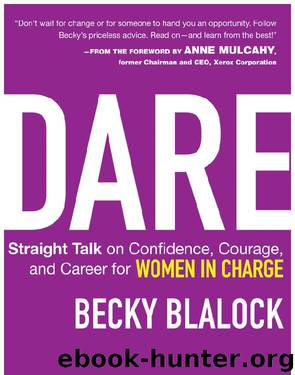Dare by Becky Blalock

Author:Becky Blalock
Language: eng
Format: epub
Publisher: Wiley
Published: 2013-08-26T16:00:00+00:00
It's not Whom You Know, It's Who Trusts You
Once you've created a diverse network, the next challenge is to become practiced in drawing information out of that network—whether it's your team, your group of contacts on LinkedIn, or your extended family. William Taylor, the cofounder of Fast Company, likes to ask the question, “What's your architecture of participation?” In other words, how are you opportunistically and systematically encouraging the people you work with to share?
It's critical to get feedback from everyone to formulate the best decisions. I made a point of stopping by each of my employees' offices face-to-face to ask, “What could I do better to make it easier for you to do your job? What do we need to change?” At one point I started hearing from a number of people, “We need more focus on leadership development.” So I pulled together a small budget for a program. We didn't spend much but had tremendous success. As a result, people in our department started getting promoted, and we got a reputation as being one of the best areas of the company to work—which meant we attracted people of a higher caliber. And it all started because I asked questions and I listened to the answers. Open yourself up to the knowledge of the people who work for you—they often know more than you do about an issue at hand.
Sharing information quickly and openly positions your team for success. As an officer in my company, I made it a habit to leave my scheduling calendar open for everyone to see. I wanted my team to know where I was and what I was doing. In return, I wanted them to share with me what they were doing.
By making my appointments public knowledge, I ensured that my team saw when a senior-level meeting was approaching. Armed with this information, they always scrambled to get me the necessary information beforehand. For my part, I took notes at those meetings and shared them with the group. I felt prepared, and they were informed.
Many other executives were aghast at this level of transparency, but I trusted my team because I knew that the benefits outweighed the risks. Openly sharing that information led to better outcomes. Further, giving my team this level of access set a tone that made them comfortable to speak their mind about serious issues—I knew they weren't afraid to tell me something I didn't yet know, or to disagree with me. Knowledge was constantly flowing in my direction.
Trust is vitally important to learning. Being systematic about pulling information from your team, from other divisions, and from your broader network is important, but trust is the softer, more subtle side of effectively teasing knowledge from others.
Jeannette Horan, the IBM CIO, hinted at the trust factor in telling me how she succeeds when she assumes a new role that takes her beyond her expertise. “Whether you are building on your academic credentials or branching out into a new field, it is always important to listen,” she says.
Download
This site does not store any files on its server. We only index and link to content provided by other sites. Please contact the content providers to delete copyright contents if any and email us, we'll remove relevant links or contents immediately.
Hit Refresh by Satya Nadella(9134)
The Compound Effect by Darren Hardy(8968)
Change Your Questions, Change Your Life by Marilee Adams(7783)
Nudge - Improving Decisions about Health, Wealth, and Happiness by Thaler Sunstein(7707)
The Black Swan by Nassim Nicholas Taleb(7129)
Deep Work by Cal Newport(7083)
Rich Dad Poor Dad by Robert T. Kiyosaki(6632)
Daring Greatly by Brene Brown(6514)
Principles: Life and Work by Ray Dalio(6449)
Playing to Win_ How Strategy Really Works by A.G. Lafley & Roger L. Martin(6306)
Man-made Catastrophes and Risk Information Concealment by Dmitry Chernov & Didier Sornette(6019)
Big Magic: Creative Living Beyond Fear by Elizabeth Gilbert(5772)
Digital Minimalism by Cal Newport;(5765)
The Myth of the Strong Leader by Archie Brown(5508)
The Slight Edge by Jeff Olson(5417)
Discipline Equals Freedom by Jocko Willink(5390)
The Motivation Myth by Jeff Haden(5212)
The Laws of Human Nature by Robert Greene(5208)
Stone's Rules by Roger Stone(5088)
